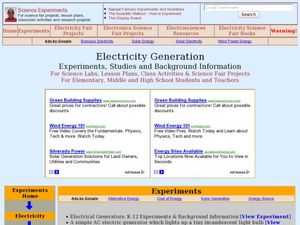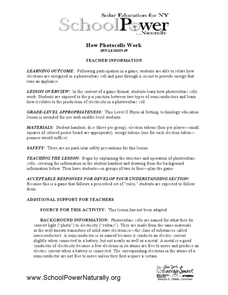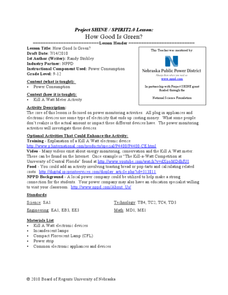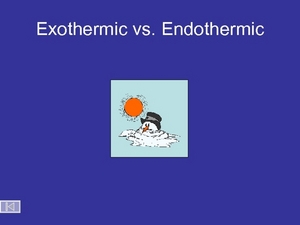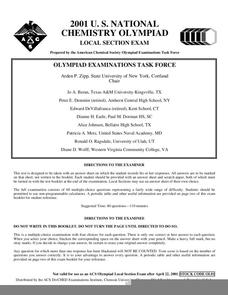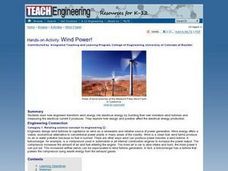Curated OER
Electricity Generation
Students study the history of electricity and the different ways we generate electricity. In this electricity lesson students complete several experiments on generating power.
Curated OER
How Photocells Work
Give small groups of physical scientists tokens that represent electrons in a photovoltaic cell. They play a dice game in which they move the tokens around, representing the flow of electrons through the p-n junction of a semiconductor...
Curated OER
Where the Buffalo Roam
Students lear about energy, energy efficiency and consumption. They measure energy use, graph the date, write a letter then design and present a PowerPoint on the topic.
Curated OER
How Good Is Green?
Students explore the amount of electricity used and wasted in homes and at school using kilowatt meters. In this environmental energy lesson, students compute power usage by appliances over time and identify ways in which electricity is...
Curated OER
Waves : An Alternative Energy Source
Students evaluate the feasibility of wave energy as an alternative source of energy. In this alternative energy source lesson students are introduced to renewable and nonrenewable energy and study energy production.
Curated OER
Exothermic vs. Endothermic
The PowerPoint opens with video footage of the decomposition of nitrogen triiodide and then explains it with diagrams. Graphs of exothermic and endothermic reactions are exhibited, as well as one for the effect of a catalyst on reaction...
Carnegie Mellon University
How Power Plants Work 2
For this second of three lessons on power plants, future engineers find out how we generate electricity and how coal-powered plants operate. They work in small groups to make electromagnet generators to light LED bulbs. A set of...
It's About Time
Energy from Coal
If plastic is derived from fossil fuels and fossil fuels come from dead dinosaurs, does that mean that plastic dinosaurs are made from real dinosaurs? This lesson goes into depth about coal and other fossil fuels. First the instructor...
Curated OER
Biomass: The Energy of the Future
Students research renewable fuels. In this alternative energy instructional activity, students compile information and create a comparison chart on renewable resources. This instructional activity includes additional suggested readings,...
Curated OER
Completing the Circuit
Students use a battery, wires, small light bulb and a light bulb holder to learn the difference between an open circuit and a closed circuit, and understand that electric current only occurs in a closed circuit. They describe the...
Curated OER
Take Charge!
Students induce an electrical charge on various objects, and experiment with electrical repulsion and attraction. They define related vocabulary, play Bingo and complete a take-home quiz.
Curated OER
A Day In My Life
Learners brainstorm how they can conserve energy in their daily lives. In this energy lesson plan, students discuss how they use energy and ways to conserve it.
Curated OER
Eco Points Score Card
Students play a game in which points are assigned to daily activities which require fossil fuels or electricity. They compare the impact their energy and transportation choices have in everyday life.
Curated OER
Alternative Energy Resources
In this alternative energy resources instructional activity, learners identify the ore that is commonly used in nuclear power plants and how it is processed. Then they determine the reaction that occurs when uranium atoms are split....
Carnegie Mellon University
Battery Workshop
Introduce your class to the workings and parts of a battery-operated circuit. Pairs of pupils use lemons to make batteries and measure voltage and current with a multimeter. An accompanying worksheet is used for recording values and...
Curated OER
2000 U.S. National Chemistry Olympiad National Exam - Part I
The National Chemistry Olympiad exams are comprehensive tests covering an entire year of chemistry concepts. You can use them as practice for competing in the challenge, or simply as a review, or as an actual final exam for your general...
Curated OER
2001 U.S. National Chemistry Olympiad - Local Section Exam
Sixty multiple-choice chemistry questions make up this comprehensive exam used for the 2001 US National Chemistry Olympiad. Every topic that you would expect to approach in a general chemistry class is queried on. You could easily use...
Curated OER
Energy Efficiency Ambassadors
Students research and compare two products that provide the same function but require different amounts of energy to do the job. They examine and demonstrate energy efficiency and discover how it applies to different technologies and...
Curated OER
Thar She Blows!: Wind Power
Students examine how wind energy is transformed into electrical energy. In pairs, they build miniature wind turbines and measure how much electrical current they produce. They asses the importance of design and position in energy...
Curated OER
Fossil Fuels: Facing the Issues
Young scholars explore energy by researching fuel usage on Earth. In this fossil fuel lesson, students define fossil fuels, the energy created by burning them, and the impact on the environment when using them. Young scholars conduct...
Curated OER
Energy Sources - Water Wheel Investigation
Pupils create their own water wheel to show the conversion of potential energy to kinetic energy. They discover the production of electricity through hydropower and apply it to different situations. They share any data collected with the...
Curated OER
Human Activity and the Environment 2004
Learners brainstorm the ways we use energy sources in our daily lives and what our lives would be like without it. They answer questions based on sections from the Human Activity and the Environment 2004, "Energy in Canada" article.
Curated OER
Robot Earth
Students construct a simple robotic energy transformer. For this space science lesson, students explain how energy is transformed from one form to another. They identify the different uses of robotic devices.
Carnegie Mellon University
Consumer Preferences in Lighting
What is a watt? This tongue-twisting, mind-bending question and others are answered through this lesson on the different lighting options available. With the support of a PowerPoint, teach your physical science class about units of...


